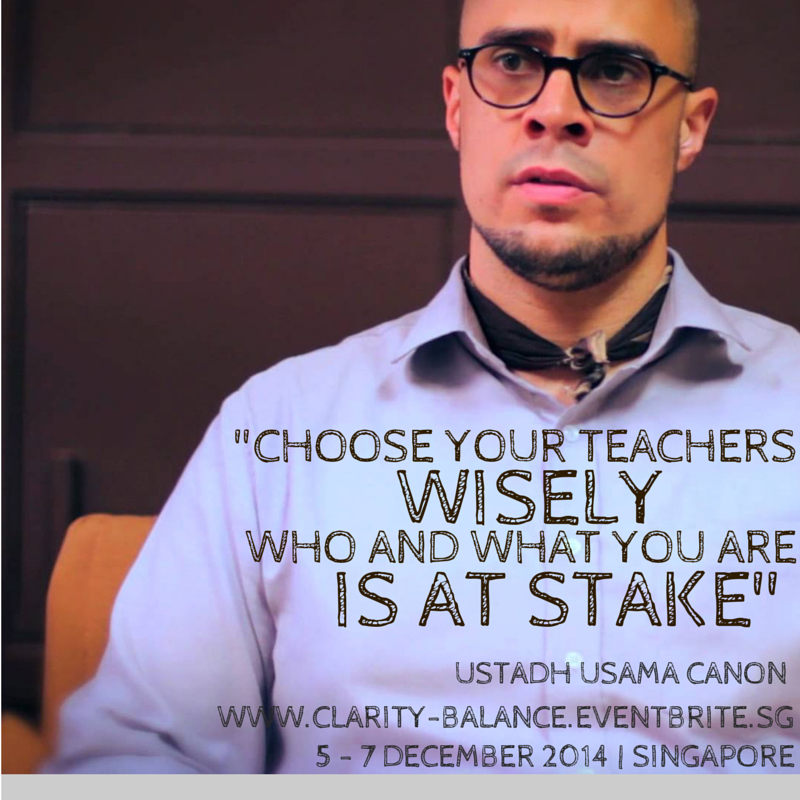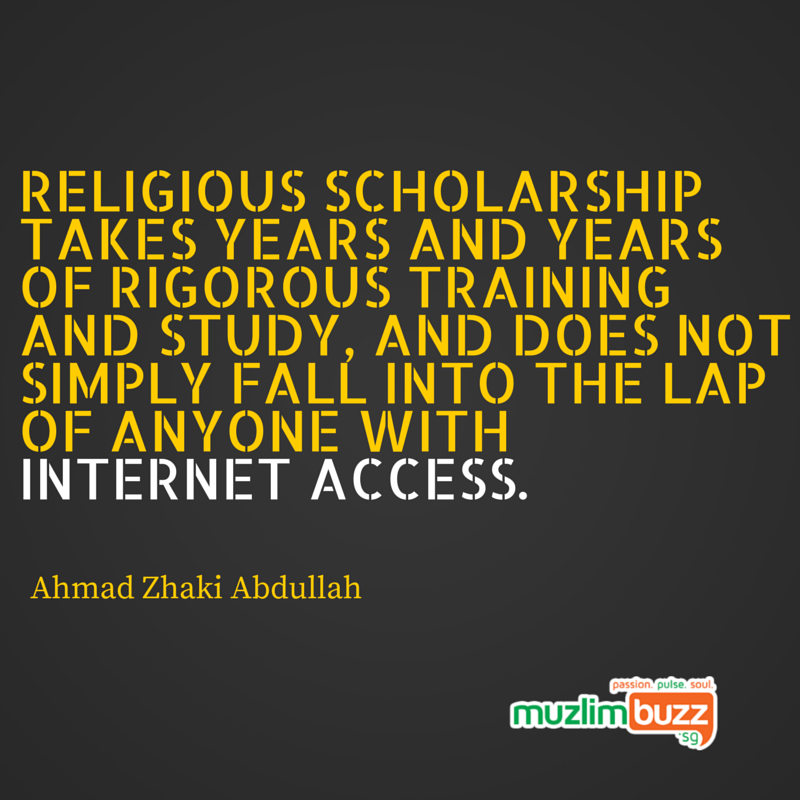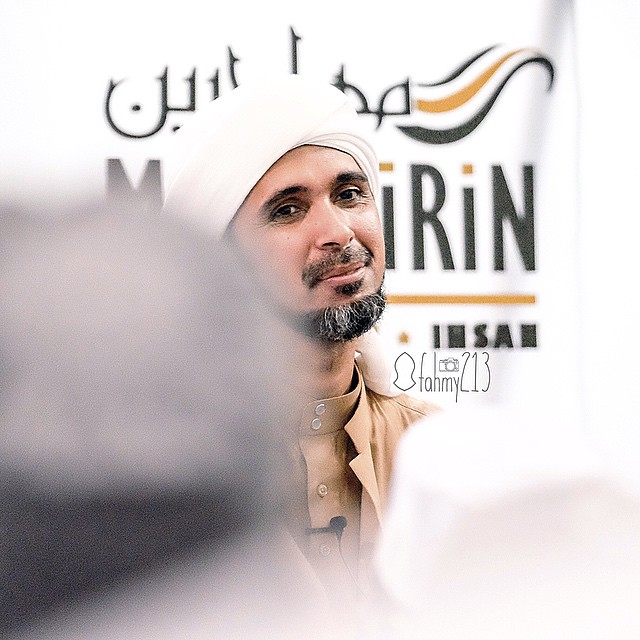What: Lecture “Challenging Hate: Islam, Conflict & Peacebuilding”
Where: Singapore Expo Max Atria
Who: Shaykh Prof Mustafa Ceric
When: 29 August 2014
By: SimplyIslam, Jamiyah Singapore, Muslim Expats Network (MEX)
The backdrop to Shaykh Prof Mustafa Ceric’s talk was a recent ceasefire in Gaza (although after over 2,000 deaths), aggression and conflict in various Muslim lands and an overall dismal state of affairs. It was heartening to see over 400 people gather at the lecture that night. It was testament to their belief and hope that they could all #ChallengeHate.
And I’m pretty sure they did not leave disappointed. Shaykh Prof Mustafa Ceric’s lecture was very organised, hopeful and full of wisdom.
The Role of Learning
He started off by talking about how humans are not machines and therefore not fixable and not predictable. It is almost impossible to predict how anyone would react to events. He also said that we are the only organism that do not have an inborn instinct towards what is good or bad for us. Unlike other animals that can sense danger, humans can’t even tell what food is good or bad for us.
The only way we can know is through learning. Shaykh emphasised that this is why the first revelation isn’t “Believe!” but “Read!” or in other words, “learn!”. He posits that what we are and who we are depends on who teaches us. Even values such as hate and love are not instinctive; they are learned.
God’s Spirit
When God created us, He breathed His Spirit into us. This Spirit is present in every human being – Muslim or not. Therefore, every human is sacred and deserving of respect and love. Shaykh explained the difference between Faith, Religion and Morality. He believes that because of the Spirit of God, all humans have faith. Religion is what we learn and choose to belong to. Morality is what makes people recognizable by their words & deeds.
Shaykh says that hate or love of others become present in our heart because of who teaches us our religion. To feel better than others, that your religion is the best and that other people from other religions are your enemies – these teachings does not belong to Islam. Shaykh warns us against teachers who propogate such ideas and who instill hatred in the hearts of their students.
Solving the Problem of Hate
Shaykh Prof Mustafa Ceric says that to solve the problem of the ideology of hatred, we need to reflect on 4 questions:
1) What is our strength?
2) What is our weakness?
3) What are the opportunities available?
4) What are the threats to us?
1) The Muslims’ strength is our belief in one God. This has endured over the years and our commitment to this belief inspires other faith communities to practice their own religion. Therefore, we should keep in mind this strength of ours when we communicate with others.
2) Our weakness is our inability to unite. Despite having 1 God, 1 Book, 1 Qiblah, we can’t even have 1 Day of Eid. We need to work on our weakness and to be able to unite despite our differences.
3) The opportunities that are present to us lies in Islam being an integrative religion. When Prophet Muhammad (peace be upon him) spread his message, he did not say all before me are wrong. Instead, he said that he came to affirm what was in the Old & New Testament. This is a huge opportunity for us to reach out and share with others. We can link up with other faith communities due to our connection with their books and yet we do not do so.
4) The most difficult and dangerous threat to us is the violence that is done in the name of Islam. Shaykh emphasized how Islam is the religion of no-compulsion and no-force. He spent a considerable amount of time explaining the root word of Islam, Iman and Ihsan (peaceful submission to God, security and beauty respectively) to prove that violence has no place in the religion.
A quote I really love from Shaykh was this: “Tolerance is a sign of strength. Intolerance is a sign of weakness.” He said that once you are confident in your faith, you are not insecure and will not hate others. But people hate and resort to violence to compensate for their own insecurity.
With Iman, Islam and Ihsan, we have to face the world and challenge hate. The more we give love, the more we have for ourself! He said, “If you are ever hesitant to give love, remember you are not giving others, you are loving yourself.”
He also says that when we hate, that hate harms others but harms us even more. He reminded us to watch what we allow in our hearts because from his experience in Bosnia, the law is not in the book, but is in the heart. What we store there will manifest in our actions and interaction with others and to safeguard against ever allowing hate to fester, in any way.
Question & Answer
The Q&A segment was one of the most interesting ones I’ve ever sat in. Someone asked for the Shaykh to share his experience in Bosnia. Instead, Shaykh read out a poem written by a former Foreign Minister of Sarajevo.
The wall in front of you
The wall behind you
The wall is all
This world has for you
But in your heart
Don’t let it grow
Young boy in Palestine
Don’t turn away
From the world
That has turned
Away from you
Allow the world
To feel ashamed
Looking you in the eye
The eye of a boy
Without boyhood
Ask
Whose hand
Ignoring death
Whose steady hand
Put the bandage
On your donkey’s leg
Ask
For you see farther
Facing the wall
Which hand
Will lead the world
The one that
Pulled the trigger
Or that which healed
Your wounded donkey
Turn around
Show the face
Of a boy that never was
Help the world
That has not helped you
For the sake
Of brave people from afar
Sharing with you
Death and Honour
In the name
Of the children in Nigeria
Syria, Mexico, Iraq
Abducted children in Australia
Dead children
On the bottom of the Mediterranean
Children still alive
In the mines and sweatshops
Children on the borders and wires
Waiting for a raindrop in deserts
Children in the Philippines
Somalia, Palestine and Bosnia
Children in the slums
Sleepless and dreamless
For the sake
Of all those
Unafraid of your memories –
Of wells with clear water
Of uncut olive trees
Last seen
In your grandfather’s eyes
When he talked of home –
The memories unscathed
By bullets and barbed wires
For the sake of children in Israel
Who bear no guilt
Turn around
Young boy in Palestine
Save this world
Help it be ashamed.”
Haris Silajdzic
Sarajevo
August 2014
It was actually a beautiful response without having to speak about the surely-painful experience of Bosnia.
Another lady asked about the need to teach adab (etiquette) and to emphasize it to our children. Shaykh agreed and lamented the fact that we read Facebook but not actual books anymore. He said it is important to engage in good literature as it builds character. He also said we need to do zikr to get peace and to make our hearts softer. “When we become closer to God, we become better to humans.”
There was a question about how we could understand the hatred and conflict happening in the Middle East. I found the Shaykh’s response to be particularly beautiful and poignant. He says that everything happens is Qada’ & Qadr (predestined). And yet prayer is the only way we can change what is written. He says that since we don’t know what is predestined and we don’t know which of our prayers are answered, we need to make lots of sincere prayers to ask Allah for peace in the Middle East.
He says that we can try to analyse and find real world solutions to the problems but that if we don’t pray for peace, it’s pointless to talk. He then appealed to the whole Muslim world and to all khatibs and imams to make public prayers for peace for the world. He also prayed, “May God make people think not about the art of war, but the art of peace and the art of tolerance.”
A young boy in the audience also asked about ISIS. Shaykh unequivocally said that ISIS is unislamic and not in accordance to the teachings of Islam. He quotes the Qur’an: those who kill one person, it is as if he killed all of humanity. He who saves one life, it is as if he has saved all of humanity. Shaykh said “If someone kills someone innocent in the name of Islam, he is not Muslim.”
Shaykh praised the harmony and peace and the collaboration he sees in the Singaporean Muslim community. He commends the government for the peace we get to enjoy and said that it is important that we do not take this for granted. He said that Singapore can set a good example for the rest of South East Asia and our role for the global Ummah.
Responding to another question, Shaykh strongly told the audience to increase our skills in managing our communities so we can work together. He says it is more important that Muslims contribute to the world instead of counting the number of converts to Islam. “We have to stop talking about how we have contributed in the past. We need to contribute NOW. Don’t talk about our great history. We don’t belong there.”
I will end this review with the following quotes by Shaykh Prof Mustafa Ceric:
“Politics is too important to be left to the politicians. We all have to be involved in the policy process.
Religion is too important to be left to the theologians. We need to learn our religion and not let others manipulate our religion to poison others.
War is too dangerous to be left to the generals. They cannot be left to decide what is war and peace.”
Bio of speaker: Dr. Mustafa Ceric has served as the Grand Mufti of Bosnia-Herzegovina since 1999. Ceric was educated at al-Azhar University in Cairo and received his Ph.D. from the University of Chicago. He served as an imam in his native Bosnia, and later at the Islamic Cultural Center in Northbrook, Illinois. The Grand Mufti has received global acclaim for his work in strengthening democracy, promoting world peace, and pursuing interfaith dialogue. Ceric was considered a pivotal leader during the war with Serbia and remains a strong voice for the survival of Islam in Europe. He sits on the World Economic Forum’s Community of West-Islam Dialogue (C-100) and various other interfaith councils throughout Europe and the Middle East. Cerci was one of the 138 Muslim signatories in October 2007 of A Common Word Between Us and You, a letter addressed to Christian leaders in an appeal for peace and cooperation between the two religions. He is listed as 49th in “The Muslim 500 – The World’s Most Influential Muslims”.
Number of people who attended: 400
Notables in the audience: Vice Ambassador of Indonesia.
Ameera Begum
Ameera is the Editor of Muzlimbuzz.sg, a chronic reader and a news junkie.













